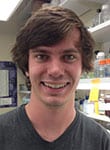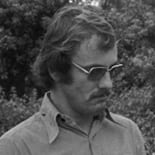News
Eaglesham Bridges BTI and Both Cambridges
Former BTI high school intern James Eaglesham has had a prestigious research career in science. And he’s just 22.
The Cornell University senior will soon graduate and head to the University of Cambridge in England as a Churchill scholar to complete a research degree in pathology. But he got his start as a high school intern in the laboratory of former BTI faculty member Ji-Young Lee.
His position in Lee’s laboratory was not only first his first lab experience but also his first job. He worked with Lee’s postdoctoral researcher Jing Zhou and spent his first summer performing the typical rite-of-passage lab maintenance duties, such as filling pipette tips boxes and collecting Arabidopsis seeds. But soon, Zhou taught him more advanced tasks, including DNA extraction and PCR, to identify genetic variations in the plants. He returned to work in Lee’s laboratory again the next summer.
“When I started at BTI, I liked science, was interested in research, and was looking for my first summer job. I didn’t realize at the time how important my experience at BTI would be for me,” said Eaglesham.
As a rising senior, Eaglesham returned to BTI as a Plant Genome Research Project summer intern, in Professor Maria Harrison’s laboratory. He worked with postdoctoral researcher Florence Breuillin-Sessoms studying arbuscular mycorrhizae, which is a symbiotic relationship where fungi enter plant roots and help them gather nutrients, such as phosphorus and nitrogen, from the surrounding soil. Specifically, he determined how quickly tree-like fungal structures that facilitate nutrient exchange with the plant, called arbuscules, turn over when infecting a mutant variety of the model plant Medicago truncatula. The results of this project appear in a paper in a leading plant journal, The Plant Cell.
“As an intern, James was already very passionate about studying viruses,” said Breuillin-Sessoms. “James was my first intern and we had a great time working together. I am not surprised by his recent success and I wish him the best of luck in his future scientific career.”
Harrison also celebrates Eaglesham’s acheivements.”It is wonderful to hear of the successes of students who trained with us and I am delighted that my lab members and I were able to offer mentorship and inspiration to James during the early stages of his scientific career. Good luck, James, and we hope you enjoy these exciting opportunities.”
Eaglesham continued to work in the Harrison laboratory throughout his senior year, putting in hours after school. “The mentorship I received at BTI was very important to me as a high school student first learning laboratory techniques and the scientific process,” he said. “My mentors at BTI always took the time to explain what we were doing and why we were doing it, which helped me feel confident in the lab.”
He then entered Cornell University and majored in biology with a concentration in microbiology. His work in the laboratory of Cornell microbiology professor Ian Hewson yielded four published papers. He also worked as a fellow at the National Institutes of Health in the summers of 2013 and 2014. He currently conducts his honors thesis research in the laboratory of John Parker at the Baker Institute for Animal Health. Specifically, he studies the immune response of human lung epithelial cells to mammalian orthoreovirus infection.
Though Eaglesham has chosen viruses over plants, his time at BTI affected him profoundly, he said. It convinced him to apply to Cornell, where he received the Hunter R. Rawlings III Cornell Presidential Research Scholarship, in recognition of his excellent research experience. The scholarship funded his work with Hewson and Parker and supplemented his living expenses while at the NIH.
“I loved working at BTI, and I look back on my experience there very fondly,” said Eaglesham. “I realize now how good that early experience in scientific research was for my career.”
Eaglesham will graduate from the College of Agriculture and Life Sciences in May and then head to Cambridge to study norovirus in the department of pathology. He received the Churchill Scholarship to fund his study. BTI President David Stern was also a Churchill scholar and recently filled Eaglesham in on his time at Cambridge over lunch.
At Cambridge, Eaglesham will pursue a research degree in the laboratory of Professor Ian Goodfellow, using a mouse model to develop a combination drug therapy to treat human norovirus. He hopes that his future research might yield insight into treating viral disease, or in advancing our understanding of basic biological processes.
When he returns to the US, Eaglesham will begin his doctorate in virology at Harvard University, in Cambridge, Massachusetts.
In another interesting BTI connection, Eaglesham’s parents first met at the Institute. Before he was born, his father, Allan Eaglesham, had a laboratory at BTI studying nitrogen fixation. His mother, Barbara, was seeking work as a technician after graduating from Cornell when someone pointed her in direction of the Eaglesham laboratory.
“I think the time that I spent at BTI served as a catalyst for my career,” said Eaglesham. “Without the experience in laboratory research I got at BTI as a high school student, I would not have had as many opportunities in research.”
Cornell Chronicle article about the Churchill Scholarship awarded to James Eaglesham




